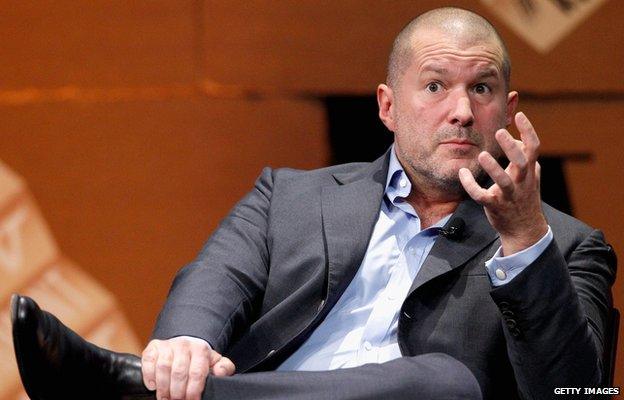Apple's designer accuses copycats of theft
- Published

Sir Jonathan says his design work meant missed weekends with the family
Apple's lead designer Sir Jonathan "Jony" Ive has hit out at companies he believes copy his firm's products.
Speaking at an event hosted by Vanity Fair, the 47-year-old said: "I don't see it as flattery, I see it as theft."
He was responding to a question from the audience about Chinese tech maker Xiaomi, but was referring to Apple's competition in general.
Xiaomi has been accused of copying before, but the company has said the suggestion was "sensationalist".
Hugo Barra, who was poached by Xiaomi from Google, said the Chinese firm was "an incredibly innovative company".
But the company has come under fire from people who believed its designs appeared similar to Apple's iPhones and iPads.
Sir Jonathan, who was born in Chingford, London, was at the San Francisco event to discuss his career.
But when asked about his feelings towards copycat manufacturers, he said: "I have to be honest the last thing I think is, 'Oh, that is flattering.'
"All those weekends I could've been home with my family - I think it's theft and lazy. I don't think it's OK at all."
Learn from mistakes
However, some argue that Apple itself is not immune from picking up design and hardware inspiration from its competitors.
"Every Apple product is an evolution of a product that has come before it," said Chris Green, principal technology analyst at Davis Murphy Group.
"They are rarely the first to come to market with a product.
Xiaomi's Mi 4 smartphone has been compared to the iPhone 4
"They sit back and see what mistakes happen. That's what they did with the iPod - they let others steam in with early mp3 players and make a mess of them."
But Mr Green said he felt the Apple designer's comments were a sign that Apple wanted to be seen as vigorously defending its work.
"When it comes to defending intellectual property based around software and appearance, it's very hard to defend that in court and to argue your position over that - rather than something that is more physical like a chip.
"They have to be seen to be defending their position."
- Published9 October 2014
- Published9 October 2014
- Published29 August 2013